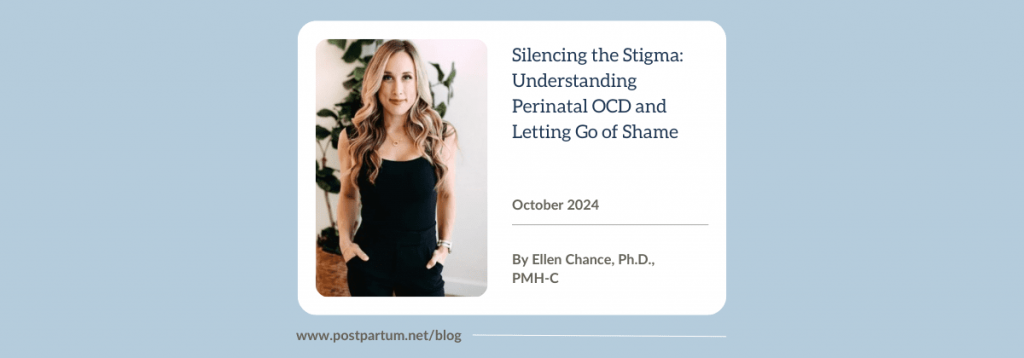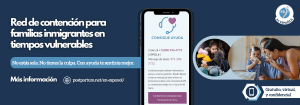By Ellen Chance, Ph.D., PMH-C
Picture this: a new mother holding her baby, overflowing with love and a profound sense of protection, but her mind is battling an invisible enemy. On the surface, everything looks perfect, but behind her smile lurk intrusive thoughts, spiraling out of control. It’s a constant push and pull—one moment she’s feeling the warmth of motherhood, and the next, she’s gripped by fear and anxiety, doubting herself, questioning everything. Compulsions quickly follow, as she becomes consumed with repetitive actions or mental rituals in a desperate attempt to quiet the storm. This is Perinatal Obsessive-Compulsive Disorder (also known as Postpartum OCD [PP-OCD]), and it’s a reality that many mothers face—often in silence.
When you’re suffering from PP-OCD, everyday moments of motherhood can become consumed by unrelenting fears and compulsions. What should be peaceful, like watching your baby sleep, may turn into a ritual of repeatedly checking whether they’re breathing or if the baby monitor is working. It can manifest as an intense preoccupation with sterilizing bottles, a consuming urge to clean, or an avoidance of seeing people out of fear the baby will get sick. For some, PP-OCD leads to removing sharp objects from the house due to an overwhelming fear of harm. Mothers may avoid holding or bathing their babies for fear of accidentally harming them, or neglect other basic caregiving tasks like feeding or diaper changes because of disturbing intrusive thoughts. In other cases, mothers might avoid certain foods or medications out of worry they could harm the baby or refuse to watch the news when it involves stories of child abuse, as it triggers their deepest fears.
PP-OCD doesn’t just steal moments—it traps mothers in cycles of anxiety and compulsion, keeping them isolated and ashamed. In this blog, I hope to shed light on the reality of PP-OCD and offer hope to those impacted by sharing ways to break free from shame, find peace, and feel whole in motherhood.
Understanding PP-OCD
PP-OCD is a specific form of obsessive-compulsive disorder that can occur during pregnancy (prenatal) or after childbirth (postpartum). This condition is marked by intrusive, unwanted thoughts (obsessions) and repetitive behaviors or mental acts (compulsions) that are performed to reduce the anxiety these thoughts provoke (Miller et al., 2022). Unlike typical worries that all mothers experience, the obsessions in PP-OCD are often deeply distressing and feel uncontrollable. They intrude on a mother’s thoughts in ways that seem completely outside her values, identity, and everything she knows about herself. These thoughts don’t reflect who she is as a mother or person—they are a symptom of the disorder, not a reflection of her true feelings, desires, or capabilities.
These obsessions can be relentless, ranging from intense fears of accidentally harming the baby to intrusive thoughts about contamination, where every surface feels like a threat. Even more distressing, these thoughts can involve disturbing and taboo subjects that completely contradict the mother’s values, such as sexually inappropriate or violent images. The more shocking the thought, the more it haunts her, leaving her trapped in shame and confusion, wondering how something so far from her true self could invade her mind so completely. These thoughts are often accompanied by compulsions like excessive checking, cleaning, or seeking reassurance, which are meant to alleviate the anxiety but only serve to reinforce the cycle of OCD.
It’s crucial that we speak openly about the nature and intensity of these intrusive thoughts. Too many women suffer in silence, terrified that these thoughts somehow reflect what they might do, or, worse, who they are at their core. They often avoid seeking help for many reasons, namely because they fear people will not trust them to care for their child. The truth is, these thoughts are nothing more than symptoms—symptoms that are not only outside of the mother’s control but are also a sign of just how deeply she cares about the life she created. PP-OCD doesn’t mean a mother is dangerous or unfit; in fact, the severity of the thoughts often stems from the overwhelming sense of responsibility and love she feels for her baby. Talking about this openly can help lift the shame and provide women with the support they desperately need, reminding them that these thoughts do not define them or their ability to be good, nurturing mothers.
Prevalence
The prevalence of postpartum OCD among women was found to range between 2.43% and 9% with the typical onset occurring within the first 8 weeks after childbirth (Ferra, Bragança, & Moreira, 2024; Miller et al., 2022), though this figure may be an underrepresentation due to the shame and fear that often prevent women from seeking help. It’s crucial to distinguish PP-OCD from other perinatal mental health conditions like perinatal anxiety and postpartum psychosis. While perinatal anxiety involves excessive worry and concern about the baby’s well-being, PP-OCD is characterized by the presence of specific, repetitive obsessions and compulsions. On the other hand, postpartum psychosis is a rare but severe condition that includes hallucinations, delusions, and impaired reality, requiring immediate medical intervention. Understanding these differences is vital for ensuring that mothers receive appropriate care and support.
The Role of Shame
One of the most damaging aspects of PP-OCD is the intense shame that often accompanies it. Many women feel horrified by the nature of their intrusive thoughts, whether those thoughts involve harm to their child, fear of harming others, contamination, or other distressing themes. Even when their thoughts don’t involve their baby directly, these women may still fear that the mere existence of such thoughts makes them a bad mother or an unsafe person. This shame is further compounded by the overwhelming fear that these thoughts reflect their true nature or capabilities.
The societal expectation that motherhood should be a time of unmitigated joy only intensifies this shame. When reality doesn’t match this idealized version, women may feel like they are failing at motherhood. This can lead to silence, isolation, and a reluctance to seek help, which only reinforces the stigma and keeps women trapped in their suffering.
It’s important to understand that shame thrives in silence, and the first step to overcoming it is to speak openly about these experiences. PP-OCD is not a reflection of a woman’s character or her ability to be a loving, capable mother. Intrusive thoughts are a hallmark of OCD—and as mentioned, they do not represent the individual’s true intentions or desires. By acknowledging PP-OCD as a treatable mental health condition, we can begin to dismantle the shame that surrounds it and encourage women to seek the help they need.
Knowing that PP-OCD is a recognized and treatable condition can be profoundly empowering for mothers. By normalizing the experience and challenging harmful misconceptions, we create a space where women feel less isolated and more supported. Seeking help becomes a sign of courage and resilience, rather than weakness, as mothers begin to understand they are not alone in their struggle.
Evidence-Based Interventions and Best Practices
Treatment for PP-OCD is most effective when approached from multiple angles, incorporating mental health therapy, pharmacological intervention, and practical and social support. Here’s what a comprehensive, evidence-based approach might look like:

Empowerment Through Knowledge and Support
Breaking the silence around PP-OCD is not just about reducing stigma—it’s about empowering women to reclaim their lives and their sense of self. By understanding what PP-OCD is, how it differs from other perinatal mental health conditions, and the impact of shame, women can begin to let go of the weight that’s been holding them back. With the right support, treatment, and information, recovery is not just possible—it’s probable.
Remember, if you are suffering you are not alone in this journey. PP-OCD is a challenging but treatable condition, and seeking help is the first step toward reclaiming joy and peace of mind. If you identify with this blog, or these symptoms align to your experiences, please know it is possible to let go of the shame, reach out for support, and take that first step toward healing. You deserve it.
Where to Find Help
If you or someone you love is struggling with PP-OCD, please know that you don’t have to navigate this alone. There is help, and you deserve support. Here are some trusted resources to guide you toward healing and connection.
Postpartum Support International (PSI) HelpLine: 1-800-944-4773 (4PPD)
Postpartum Support International (PSI) offers a confidential helpline where you can talk with someone who truly understands the challenges of perinatal mental health disorders like PP-OCD. Whether you need emotional support, information, or help connecting with a local provider, PSI’s helpline is a great place to start.
Text “Help” to 800-944-4773 (English) or text “Ayuda” to 971-203-7773 (Spanish).
PSI’s volunteers are trained to listen, provide support, and help connect you with the right resources for your needs. Sometimes just knowing someone is there can make all the difference.
PSI Provider Directory
Finding the right mental health provider is key to recovering from PP-OCD. PSI’s Provider Directory connects you with professionals who hold advanced training and/or certification in perinatal mental health. These providers understand the unique challenges that come with perinatal mental health disorders, and they use evidence-based practices to help you find relief.
You can search for a certified provider near you by entering your city, state, or zip code.
Why Certification Matters
It’s important to work with a mental health provider who specializes in perinatal mental health because PP-OCD is complex and different from general OCD. A Perinatal Mental Health Certification (PMH-C) ensures that your provider understands how pregnancy, birth, and postpartum affect your mental health. These specialists are trained to help you manage the emotional, social, hormonal, and biological changes unique to this time in your life.
PSI Support Group for PP-OCD
You’re not alone. PSI offers free online support groups for moms experiencing PP-OCD. In these groups, you’ll connect with others who truly understand what you’re going through. Sometimes, just knowing that other moms are having similar experiences can help lift the shame and make you feel less isolated. The groups are led by trained peer supporters with live experience and focus on both emotional support and practical coping strategies.
You can learn more and join a group here: PP-OCD Support Group
References:
Miller, M. L., Roche, A. I., Lemon, E., & O’Hara, M. W. (2022). Obsessive-compulsive and related disorder symptoms in the perinatal period: Prevalence and associations with postpartum functioning. Archives of Women’s Mental Health, 25(4), 771-780. https://doi.org/10.1007/s00737-021-01184-5
Ferra, I., Bragança, M., & Moreira, R. (2024). Exploring the clinical features of postpartum obsessive-compulsive disorder: A systematic review. The European Journal of Psychiatry, 38(1), 100232. https://doi.org/10.1016/j.ejpsy.2023.100232
Provider Directory
Learn More About Perinatal Mental Health Disorders
Get Help
Perinatal OCD Support Groups










